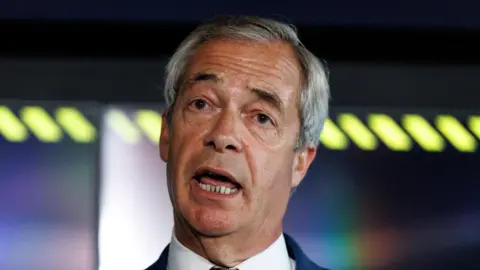In a recent move that has stirred political dialogue, Nigel Farage, the leader of Reform UK, has publicly asked Prime Minister Sir Keir Starmer to consider appointing members of his party to the House of Lords. This appeal, articulated through a letter directed at Starmer, underscores Farage’s dissatisfaction with what he deems a democratic imbalance in the upper chamber of Parliament. According to Farage, the existing representation favors parties with fewer Members of Parliament (MPs), which he believes is fundamentally unfair.
Reform UK, despite having gained a solid footing in British politics, is notably absent from the House of Lords. Currently, the party has four MPs in the House of Commons and governs ten councils across England. This disparity of representation—while parties like the Green Party, Plaid Cymru, and the Ulster Unionist Party control 13 peers collectively—is an issue Farage wishes to rectify. The appointments to the House of Lords rest solely with the Prime Minister, making this call to action not just a plea but a challenge to the current political status quo.
The House of Lords serves a critical role within the framework of Parliament, acting independently to scrutinize government work and legislation. Its members, known as peers, engage in in-depth analyses of governmental proposals akin to the duties performed by MPs in the House of Commons. Presently, there are over 800 peers, a figure that reflects the extensive scope of representation.
In his letter, Farage brings up the weight of votes his party received—over 4.1 million in the July 2024 general election. He emphasizes that Reform UK has taken significant strides in local government elections, holding the lead in national opinion polls and achieving a narrow victory in a recent by-election. This success, along with recent gains in local elections, has bolstered his assertion that Reform UK has positioned itself as a credible alternative opposition party.
Farage’s argument posits that the situation is untenable in light of the political landscape’s “seismic shifts.” He references the Liberal Democrats, who, despite having a lower electoral turnout than Reform UK, boast 76 peers and maintain 72 seats in the Commons. This performance disparity—a scenario where votes do not equate to proportional representation in the House of Lords—leads Farage to advocate for what he considers a necessary reform for addressing these inequalities.
In his characteristically measured and assertive tone, Farage describes his request as “modest,” yet crucial. He does not clarify who he might nominate for these peerages, which leaves room for speculation about the potential composition of the Lords if his party’s voices are heard. Interestingly, he’s aware of an ongoing push within the government to address the hereditary peers’ roles in the House of Lords, hinting at a broader conversation about reform in the upper chamber.
Historically, Prime Ministers have often sought nominations for peerages from leaders of opposition parties, although there exists no formal constitutional requirement to do so. This situates Farage’s call within a framework of opportunity—a chance for political negotiation amidst a backdrop of electoral victories and public opinion shifts. For context, Starmer’s own tenure has seen appointments of 30 new Labour peers, contributing to wider discussions about party representation.
In conclusion, Farage’s advocacy for parliamentary reform isn’t merely an isolated demand; it serves as an entry point into broader discussions regarding representation, accountability, and reform in modern British politics. As Reform UK continues to consolidate its presence, the pressure is mounting for existing party structures to adapt and reflect the evolving opinions and demographics of the British electorate. The national discourse is set to evolve significantly as some parties reassess their standings and the implications of electoral outcomes on legislative frameworks.












